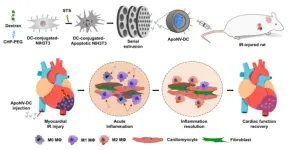(Press-News.org) At a pivotal time for Medicaid health coverage for Americans with low incomes, a report on the impacts of Michigan’s Medicaid expansion shows very positive effects, as well as opportunities for continued improvements.
The report was produced by the University of Michigan Institute for Healthcare Policy and Innovation as part of its evaluation of the Healthy Michigan Plan, Michigan’s Medicaid expansion program. The program currently has about 1 million enrollees and was signed into law 10 years ago this September.
On the whole, the report shows that the Healthy Michigan Plan has been effective at:
reducing uninsurance,
supporting financial well-being,
promoting primary care and responsible use of health care services among people with low incomes, and
sustaining the safety net and supporting coordinated strategies to address social determinants of health.
The report also draws on data and interviews to show that two unique aspects of Michigan’s expansion – financial incentives for participants to focus on healthy behaviors, and income-based cost-sharing to foster personal responsibility around health care decisions – were only partially effective at achieving their aims.
Read the IHPI Policy Brief
Read the full report
IHPI’s evaluation is funded by the Michigan Department of Health and Human Services and is required by the federal Centers for Medicare and Medicaid Services as part of Michigan’s Medicaid expansion waiver. This was the interim report released midway through the waiver period.
Data that could inform Michigan and other states
The findings have implications far beyond Michigan, the IHPI team notes.
Right now, all states are in the process of “unwinding” the special Medicaid continuous-enrollment provision that was put in place during the height of the Public Health Emergency during the COVID-19 pandemic.
Since April, more than 5.3 million people have lost Medicaid coverage nationally in the 45 states and District of Columbia that have reported data as of August 24. Redeterminations, as they are called, of individual eligibility will continue into 2024.
Michigan has launched an online dashboard to track redetermination data including the number of individuals whose Medicaid is not being renewed. MDHHS recently provided an update on the process and efforts to reach participants who need to provide information to determine their eligibility.
Measuring the impacts of the unwinding on individuals, health systems and safety net agencies will be important, especially in light of the positive impacts of expansion coverage, the authors of the IHPI report say.
At the same time, several states that did not adopt Medicaid expansion in the first six years of the program through 2019 have done so in the last few years; a full list of current state policies is available here. About 1.9 million adults who have potentially qualifying low incomes live in the 10 states that have not expanded Medicaid under the federal program.
“Since 2014, the Healthy Michigan Plan has increased access to care and was associated with improved health and other outcomes reported by beneficiaries, many of whom were previously uninsured or unconnected to social support services that can impact health,” said John Z. Ayanian, M.D., M.P.P., director of IHPI and leader of the HMP evaluation project.
He continued, “During the COVID-19 pandemic, the Healthy Michigan Plan maintained access to coverage and care for those already enrolled and offered coverage for new beneficiaries affected by unemployment and loss of health insurance. We hope our findings will inform other states as they go through the process of redetermination, consider partial or full expansion of Medicaid, or consider implementing specific features into their Medicaid programs such as cost-sharing provisions or healthy behavior incentives.”
A recently enacted Michigan law modifies some of the income-based cost-sharing requirements of the Healthy Michigan Plan, which the IHPI report finds have not fully achieved their aim and which the team had recommended simplifying in its report. The new law made other updates to the program too.
Key facts about the Healthy Michigan Plan and the IHPI evaluation:
The program is open to Michigan residents ages 19 to 64 who earn an income at or below 138% of the federal poverty level – as of 2022, $18,754 for an individual or $36,908 for a family of four.
The program began covering Michiganders in 2014 and now covers about 1 in 10 people living in the state. In all, about 1 in 4 Michiganders have some form of Medicaid or Children’s Health Insurance Program coverage.
The program was enacted under a federal waiver that allowed Michigan to implement provisions aimed at increasing healthy behaviors and personal responsibility regarding use of health care, and basing cost-sharing on a person’s income.
During the time examined by the report, people whose incomes were between 100% and 138% of the federal poverty level were required to pay monthly fees of $24 to $32 for HMP coverage and higher co-pays for some services than people with incomes under the poverty level.
Some services are available without a co-pay based on their role in preventing, detecting or managing major health conditions.
HMP enrollees are incentivized by lower co-pays and/or fees to complete a Health Risk Assessment or HRA and discuss it with a provider, and to engage in healthy behaviors such as stopping tobacco use or getting a flu shot.
The IHPI team has been evaluating the program’s impact since it began.
For the current interim evaluation report, the team conducted a survey of more than 4,000 participants in HMP, including more than 1,400 who had completed previous surveys in earlier years.
The team interviewed dozens of participants who had been subject to cost sharing (co-pays and/or monthly fees), as well as primary care providers and stakeholders from state government agencies and safety-net organizations.
The team also examined changes over time in administrative data from hundreds of thousands of HMP participants, and data from national surveys and hospital financial reports.
Key findings of the report:
Uninsurance:
Uninsurance rates in Michigan in 2020 were lower than in other states that expanded Medicaid, and much lower than in states that hadn’t expanded Medicaid at that time.
All areas of the state experienced reductions in the uninsurance rate among non-elderly adults that cut the rate in half or more between 2013 and 2020, with the rate going down to 6% in some areas.
Employment and finances:
Despite the income limits of the program, 44% of surveyed HMP enrollees were employed at a job, and another 16% were self-employed at the time of the survey. Of those with a job, 56% worked full time.
Half of employed participants, and 78% of non-employed ones, said they have barriers that interfere with their ability to work, how much they can work, or the type of work they can do.
Participants say HMP coverage helped them reduce their out-of-pocket health care costs, get access to medical treatment that in some cases allowed them to begin or continue working, and freed up financial resources for other needs such as food, transportation and housing.
Primary care:
Nearly all (91%) of surveyed HMP participants reported having a primary care provider (physician, nurse practitioner or physician assistant).
In all, 81% of those with a primary care provider reported having a visit in the last year, and 77% reported no barriers to getting primary care.
Primary care providers reported offering more same-day and after-hours appointments to encourage responsible use of health care services.
Emergency department use:
ED visit rates, and rates of high-frequency ED use (5 visits or more a year) were lowest for beneficiaries who had regular preventive visits, compared to those with irregular or no preventive visits.
ED visits dropped over time among enrollees with four major chronic conditions (COPD, asthma, cardiovascular disease and diabetes) who were enrolled for multiple years.
Hospital impacts:
Michigan hospitals saw a 50% drop in the amount of care for which they did not receive payment (also called uncompensated care) after HMP began.
The percentage of hospitalized patients without insurance dropped by 69%.
Cost sharing and health risk assessment/healthy behavior provisions:
In all, 75% of surveyed HMP enrollees knew that some types of health visits and services have no co-pay.
Only 29% knew that completing an HRA or a healthy behavior could reduce the amount they pay overall.
Interviews with providers also revealed lack of familiarity with these incentives, and a desire to have HRA information added to electronic health records.
People who had been enrolled in HMP for longer times were more likely to have had primary care and dental visits, to have had cancer screenings, and to have completed an HRA.
Interviews suggest that self-motivation and support from their health care providers, not financial incentives, drove HRA completion and healthy behaviors.
Safety net services and providers:
Primary care and safety-net health care providers reported deploying more care managers and community health workers to conduct regular outreach to high-need individuals.
Safety-net providers reported more financial stability and an increased ability to expand services, collaborate with other agencies and sustain efforts to address social determinants of health.
HMP undergirds other programs such as Michigan’s Section 1115 behavioral health demonstration for substance use disorder, Health Homes programs for people who have both chronic medical and behavioral/mental health conditions, the Medicaid Health Equity Project to address racial disparities through evidence-based interventions, and programs to allow inmates to apply for HMP before they leave prison. END
As Medicaid ‘unwinding’ continues and more states expand eligibility, Michigan report provides key insights
Medicaid expansion reduced uninsurance, promoted primary care, supported financial well-being and strengthened the safety net for Michiganders with low incomes
2023-08-25
ELSE PRESS RELEASES FROM THIS DATE:
Smokers who start below age 20 become more addicted and find it difficult to quit
2023-08-25
Amsterdam, Netherlands – 25 Aug 2023: Researchers urge governments to raise the legal age to purchase cigarettes to 22 years or higher as study finds it becomes less addictive and easier to quit as people get older. The research is presented at ESC Congress 2023.1
In 2020, more than one in five people worldwide used tobacco.2 Tobacco kills up to half of its users.2 Smokers below the age of 50 years have a five-fold higher risk of developing cardiovascular disease compared with their non-smoking peers.3 The legal age to purchase tobacco is 18 years old in many ...
Cluster of slightly unhealthy traits linked with earlier heart attack and stroke
2023-08-25
Amsterdam, Netherlands – 25 Aug 2023: Middle-aged adults with three or more unhealthy traits including slightly high waist circumference, blood pressure, cholesterol and glucose have heart attacks and strokes two years earlier than their peers, according to research presented at ESC Congress 2023.1
“Many people in their 40s and 50s have a bit of fat around the middle and marginally elevated blood pressure, cholesterol or glucose but feel generally well, are unaware of the risks and do not seek medical advice,” said study author Dr. Lena Lönnberg of Västmanland County ...
Reefs made from culled trees can help kickstart sea life in threatened waters
2023-08-25
Reefs, whether natural or man-made, are hotspots of marine biodiversity. But especially in soft-bottomed seas, reefs have now become scarce because many hard substrates have been removed due to overfishing of shellfish, dredging, trawling, and deep-sea mining. How can we restore this lost biodiversity, as encouraged by the UN Decade on Ecosystem Restoration (2021-2030) and the EU Biodiversity Strategy?
Now, researchers have shown that culled fruit trees sunk into the sea are a cheap and effective way to recreate reefs and boost the local diversity and abundance of marine life. The study, published ...
Paper cups are just as toxic as plastic cups
2023-08-25
Replacing single use plastic cups with paper ones is problematic. Researchers at the University of Gothenburg show that a paper cup that ends up in nature can also cause damage as they also contain toxic chemicals.
Reports of plastics pollution contaminating all parts of the Earth and in all living things has accelerated a shift to alternative materials. The coffee latte you take with you from the kiosk on the corner now comes in paper cups, sometimes even with paper lids. But that cup can also harm living ...
Dance as a performative art form enhanced identity negotiation and strengthened group identity in people with Parkinson’s disease
2023-08-25
A recent study by the University of Eastern Finland and Balettakademien Stockholm found that performing in a dance company and being involved in its activities play a significant role in the identity and disease-related identity negotiation in people with Parkinson’s disease. Performing in the dance company and sharing the process of performing with others created a strong group identity for the dancers with Parkinson’s disease. The dancers’ experiences of watching and being watched provided them with novel ways of expressing themselves and being seen without their identity being associated with Parkinson’s disease.
Earlier ...
Myocardial infarction, the number one cause of sudden death, may be treated by modulating the immune response.
2023-08-25
Myocardial infarction, the number one cause of sudden death in adults and the number two cause of death in Korea, is a deadly disease with an initial mortality rate of 30%, and about 5-10% of patients die even if they are transported to a medical center for treatment. The number of myocardial infarction patients in Korea has been increasing steeply, from 99,647 in 2017 to 126,342 in 2021, an increase of 26.8% in five years. Until now, drug administration, percutaneous angioplasty, and arterial bypass surgery have been known as treatments, but ...
Alternatives to indwelling urinary catheters help patients avoid infections and urethral trauma
2023-08-25
ARLINGTON, Va. (August 25, 2023) — Avoiding the unnecessary use of indwelling catheters and promptly removing catheters that are no longer needed are the first steps in preventing catheter-associated urinary tract infections in acute care hospitals, according to new recommendations developed by five medical societies and published today in the journal Infection Control & Hospital Epidemiology.
“Urinary catheters can be associated with infection and also with non-infectious harms like trauma and obstruction,” said Payal Patel, M.D., an infectious disease physician at Intermountain Health and ...
UCLA researchers say embedding study recruitment in pre-appointment check-in may significantly boost participation
2023-08-25
FINDINGS
UCLA researchers find that they can electronically recruit patients for biomedical research at rates up to 40 times higher than the traditional method of patient portal messages by embedding study recruitment into the pre-appointment preCheck-in page.
BACKGROUND
While patient portal messages are increasingly used to recruit patients for research studies, this method typically results in study enrollment rates of 1-8%. In addition, this method of study recruitment has historically led to ...
New ‘promising medicines’ fund may incentivise commercialisation of high price drugs with weak evidence on clinical benefits
2023-08-25
A new fund to fast-track patient access to potentially valuable new medicines may incentivise the pharmaceutical industry to develop high priced drugs for rare diseases with weak evidence on clinical benefits.
Health economics and policy academics from the London School of Hygiene & Tropical Medicine (LSHTM), writing in the Journal of the Royal Society of Medicine, warn that if the NHS England Innovative Medicines Fund (IMF) is not implemented appropriately, it risks disincentivising the generation of essential evidence and could shift the financial burden from the pharmaceutical industry to the public finances.
The IMF operates on similar terms to ...
Certain gut conditions may be early warning signs of Parkinson’s disease
2023-08-25
Certain gut problems, such as constipation, difficulty swallowing, and irritable bowel syndrome (IBS), may be early warning signs of the neurological condition Parkinson’s disease, suggests research published online in the journal Gut.
Gastrointestinal symptoms are thought to precede the development of cerebrovascular disease, such as stroke or a brain aneurysm, or Alzheimer’s disease, and it has been suggested (Braak’s hypothesis) that gut conditions may precede the development of Parkinson’s disease too.
To ...
LAST 30 PRESS RELEASES:
Emerging class of antibiotics to tackle global tuberculosis crisis
Researchers create distortion-resistant energy materials to improve lithium-ion batteries
Scientists create the most detailed molecular map to date of the developing Down syndrome brain
Nutrient uptake gets to the root of roots
Aspirin not a quick fix for preventing bowel cancer
HPV vaccination provides “sustained protection” against cervical cancer
Many post-authorization studies fail to comply with public disclosure rules
GLP-1 drugs combined with healthy lifestyle habits linked with reduced cardiovascular risk among diabetes patients
Solved: New analysis of Apollo Moon samples finally settles debate about lunar magnetic field
University of Birmingham to host national computing center
Play nicely: Children who are not friends connect better through play when given a goal
Surviving the extreme temperatures of the climate crisis calls for a revolution in home and building design
The wild can be ‘death trap’ for rescued animals
New research: Nighttime road traffic noise stresses the heart and blood vessels
Meningococcal B vaccination does not reduce gonorrhoea, trial results show
AAO-HNSF awarded grant to advance age-friendly care in otolaryngology through national initiative
Eight years running: Newsweek names Mayo Clinic ‘World’s Best Hospital’
Coffee waste turned into clean air solution: researchers develop sustainable catalyst to remove toxic hydrogen sulfide
Scientists uncover how engineered biochar and microbes work together to boost plant-based cleanup of cadmium-polluted soils
Engineered biochar could unlock more effective and scalable solutions for soil and water pollution
Differing immune responses in infants may explain increased severity of RSV over SARS-CoV-2
The invisible hand of climate change: How extreme heat dictates who is born
Surprising culprit leads to chronic rejection of transplanted lungs, hearts
Study explains how ketogenic diets prevent seizures
New approach to qualifying nuclear reactor components rolling out this year
U.S. medical care is improving, but cost and health differ depending on disease
AI challenges lithography and provides solutions
Can AI make society less selfish?
UC Irvine researchers expose critical security vulnerability in autonomous drones
Changes in smoking status and their associations with risk of Parkinson’s, death
[Press-News.org] As Medicaid ‘unwinding’ continues and more states expand eligibility, Michigan report provides key insightsMedicaid expansion reduced uninsurance, promoted primary care, supported financial well-being and strengthened the safety net for Michiganders with low incomes



